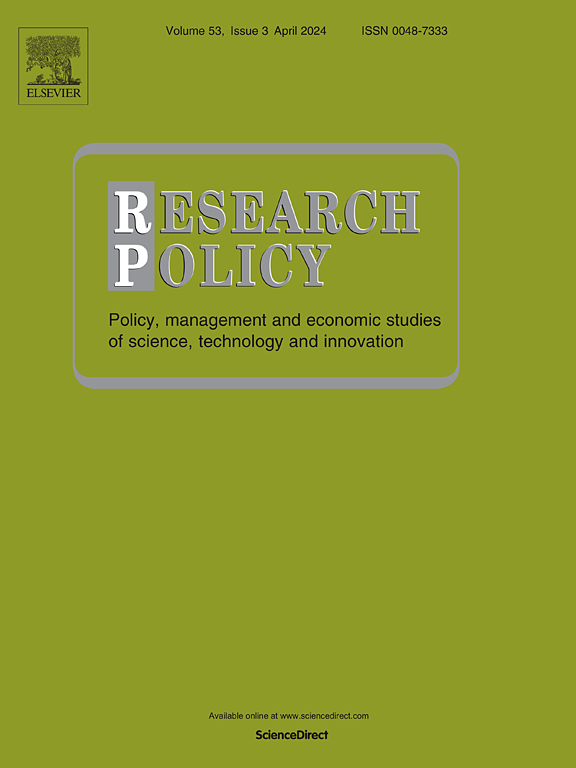Secondhand social capital and idea quality in open innovation communities
IF 8
1区 管理学
Q1 MANAGEMENT
引用次数: 0
Abstract
Open innovation communities provide valuable opportunities for creators from diverse backgrounds to collaboratively generate and refine new ideas that companies can implement in new products or services. However, many submitted ideas in these communities are underdeveloped or misaligned with companies' expectations, raising questions about what drives high-quality ideas and, more specifically, innovation potential. We focus on the role of secondhand social capital, i.e., the indirect network benefits an idea accrues through feedback from providers who are themselves actively engaged with other influential ideas in the community. While prior research has explored ego-centric or first-hand networks, we extend this work by examining how an idea's position within feedback networks shapes its elaboration and innovation potential. We argue that feedback from highly connected feedback providers confers greater visibility, legitimacy, and alignment with community expectations, thereby enhancing the quality of an idea. Using data from an open innovation platform for vehicle design, we find that secondhand social capital significantly predicts higher-quality ideas. By contrast, traditional measures of network constraint (e.g., closure, structural holes) are not consistently and significantly associated with idea quality. Further, our analysis suggests that when feedback is constructive and encouraging, the effect of secondhand social capital is stronger. Our findings contribute to theory by identifying secondhand social capital as a key mechanism linking network structure and idea quality. More broadly, this research bridges micro-level creativity and macro-level innovation literatures by emphasizing feedback through secondhand social capital as a linchpin connecting idea generation and implementation in decentralized, collaborative environments.
开放式创新社区的二手社会资本与创意质量
开放的创新社区为来自不同背景的创造者提供了宝贵的机会,让他们共同产生和完善新想法,公司可以在新产品或服务中实施这些新想法。然而,在这些社区中提交的许多想法都不发达,或者与公司的期望不符,这引发了一个问题:是什么驱动了高质量的想法,更具体地说,是什么驱动了创新潜力。我们关注的是二手社会资本的作用,也就是说,一个想法通过积极参与社区中其他有影响力的想法的提供者的反馈而产生的间接网络收益。虽然先前的研究已经探索了以自我为中心或第一手网络,但我们通过研究一个想法在反馈网络中的位置如何影响其阐述和创新潜力来扩展这项工作。我们认为,来自高度联系的反馈提供者的反馈赋予了更大的可见性、合法性和与社区期望的一致性,从而提高了想法的质量。利用汽车设计开放式创新平台的数据,我们发现二手社会资本显著预测更高质量的创意。相比之下,传统的网络约束措施(例如,封闭性、结构性漏洞)与创意质量并没有一致和显著的联系。此外,我们的分析表明,当反馈具有建设性和鼓励性时,二手社会资本的作用更强。研究发现,二手社会资本是影响网络结构和创意质量的重要因素。更广泛地说,本研究通过强调二手社会资本反馈是在分散、协作环境中连接创意产生和实施的关键,将微观层面的创造力和宏观层面的创新文献联系起来。
本文章由计算机程序翻译,如有差异,请以英文原文为准。
求助全文
约1分钟内获得全文
求助全文
来源期刊

Research Policy
MANAGEMENT-
CiteScore
12.80
自引率
6.90%
发文量
182
期刊介绍:
Research Policy (RP) articles explore the interaction between innovation, technology, or research, and economic, social, political, and organizational processes, both empirically and theoretically. All RP papers are expected to provide insights with implications for policy or management.
Research Policy (RP) is a multidisciplinary journal focused on analyzing, understanding, and effectively addressing the challenges posed by innovation, technology, R&D, and science. This includes activities related to knowledge creation, diffusion, acquisition, and exploitation in the form of new or improved products, processes, or services, across economic, policy, management, organizational, and environmental dimensions.
 求助内容:
求助内容: 应助结果提醒方式:
应助结果提醒方式:


